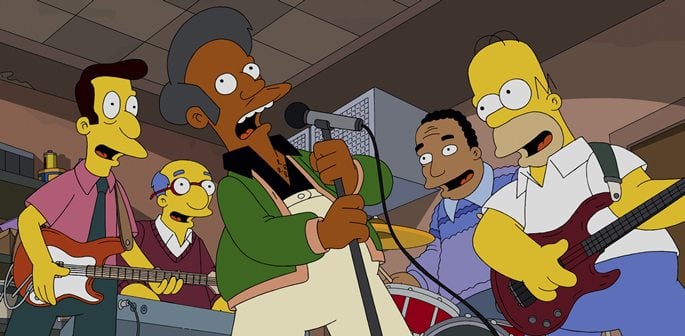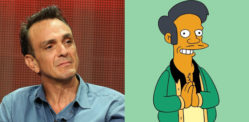Apu's character has been criticised for being racist and playing to stereotypes. Being voiced by a white American doesn't help either.
The Simpsons is the longest-running prime-time sitcom in the United States, having first found the wind beneath its wings back in 1987.
The social and political satire show is Fox’s version of Sharmaji ka beta with 29 successful full seasons and three short ones, dominating screens across the US and subsequently the world.
Besides the legendary predictions of major political milestones in American history, including that eerie 9/11 reference, President Trump and Disney taking over Fox, the show also gave the world one of the most debated characters of all time: Apu.
When he first stepped out of The Simpsons drawing board, Dr Apu Nahasapeemapetilon Jr would have never imagined in his wildest dreams that he would be the eye of a huge racial storm.
Several Indian-origin actors and comedians have spoken about the pitiable state of representation of Indians in American pop culture.
This even saw a documentary titled The Problem with Apu being made in 2017.
The heated debate between a community that had learned to stand up for how it was portrayed and the ones doing the actual representation culminated with a salty episode from The Simpsons in April 2018.
#TheSimpsons completely toothless response to @harikondabolu #TheProblemWithApu about the racist character Apu:
"Something that started decades ago and was applauded and inoffensive is now politically incorrect… What can you do?" pic.twitter.com/Bj7qE2FXWN
— soham (@sohamberlamps) April 9, 2018
Several netizens across the Twitterverse have slammed the sudden ‘identity outbursts’ the community is currently experiencing.
With the snowflake culture currently gripping socially active citizens world over, several people have called attention to how The Simpsons is entirely about parodying the stereotype.
The whole #TheProblemWithApu is laughable at best…YES, Apu is perpetuating a stereotype, but EVERYTHING ELSE IN THE SHOW IS. The Simpsons is, and always has been, a show composed 99% of stereotyped characters. Even Homer is the embodiment of the "white-american" stereotype.
— JaySaltyGeez (@JaySaltyGeez) May 2, 2018
Meanwhile, whether the minds behind the show have shot themselves in the foot with this response is another issue altogether.
The bigger question here is, is the Apu debate a non-issue? If it isn’t, why is it so hard to understand?
What is the ‘Simpsons-Apu’ Debate About?
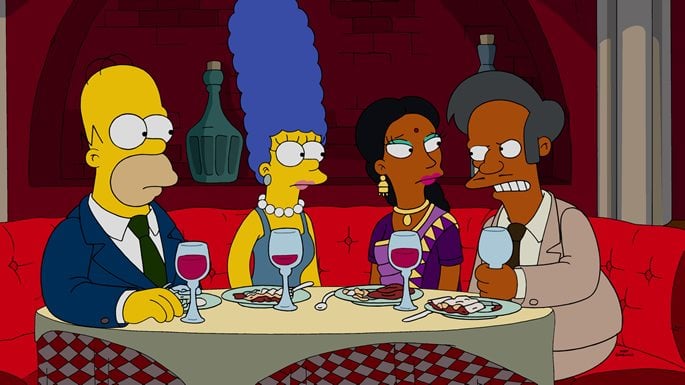
This racial debate didn’t stem from an Indian suddenly waking up one day determined to have a problem with the depiction of his people on screen.
The Apu issue finds its roots way back in 2013 in a piece written for the Huffington Post by culture critic Mallika Rao. She writes:
“As of 2012, Asian Americans were so affluent and numerous that one Nielsen report claimed they would form the 18th richest economy in the world were they to split off into their own nation.
“Meanwhile, in fictional Springfield, Apu is still selling hot dogs with a funny accent. Endearing and occasionally wise he may be, but his legacy is one that continues to thwart Indian actors looking to play three-dimensional characters.”
The piece also references the de-facto voice of the Anti-Apu movement, Hari Kondabolu.
The 35-year-old comic is the brain behind the documentary The Problem with Apu, which sees him speak to several comedians and actors including Hasan Minhaj, Aziz Ansari, Kal Penn and Russell Peters among several others.
For Hari and all the people he spoke to, Apu was a hated reminder of the kind of impression America holds of the quintessential Indian immigrant.
Apu is a doctorate holder, top of his class of 7,000,000 (yes, the booming population reference is clear). He works at a convenience shop and presses his hands in namaste when the opportunity strikes.
Like every other Indian’s dream, he too has an arranged marriage, a union that gives him eight children. The cause though is not this.
The Simpsons, as detractors have pointed out, is a show build on stereotypes.
What has truly rubbed every South Asian the wrong way is that the man behind this clever yet cunning strongly accented Indian character is a white man called Hank Azaria.
A Country of a Billion but None Good Enough to be Apu
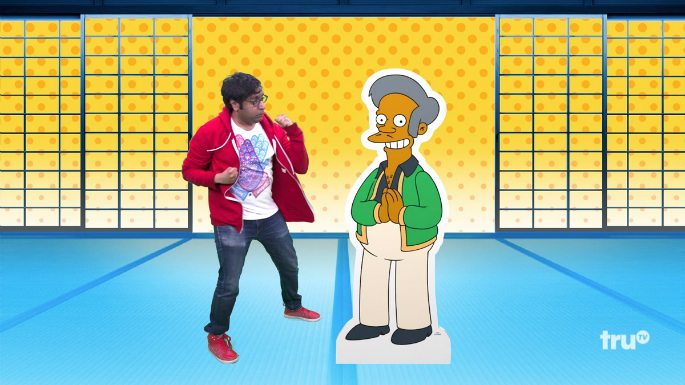
Hari’s first rant didn’t come in 2017. It was a carefully structured understanding of how racism was strengthening the very ceiling Desi-American artists were trying to break in the first place.
In an episode of the FX show Totally Biased with W Kamau Bell, he criticised voice actor Azaria (who was Jewish by descent), calling him “a white guy doing an impression of a white guy making fun of my father.”
He covered several other stereotypes comfortably nestled in mainstream film and cinema in America.
This was, however, more than just about a ‘white’ man telling a ‘brown’ man’s story apparently better than any person from the land of the baby factory can.
What this became about what the apparent justification for these choices.
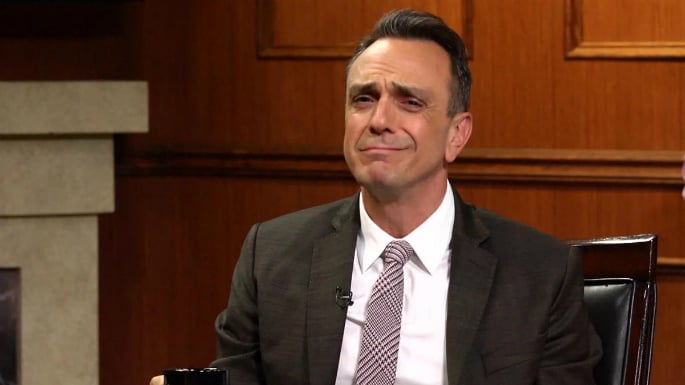
In a radio interview back in 2007, Hank Azaria explained his accent and recalled the meeting with the writers when moulding Apu’s voice:
“Right away they were like ‘Can you do an Indian accent and how offensive can you make it?’ basically.”
The point here is not to paint him as racist. The point isn’t even about how nonchalantly it could be passed off as acceptable.
The question here is, why is the show so immune to change?
When systems world over are tuning their wiring to be more inclusive, why does Apu still have to sound the way he does and behave the way he behaves?
Why does Apu still have to perpetuate the American notion of an Indian immigrant when the community has moved a million steps ahead?
The Curious Case of the Brownface

The Simpsons isn’t the only mainstream entertainment programme that has sailed tricky waters.
Disney has often run into trouble with their casting choices for characters from ethnic backgrounds.
Naomi Scott’s casting in the upcoming Aladdin live-action film got people fuming.
Who can forget Robert Downey Jr’s ‘blackface’ controversy when Tropic Thunder came out in 2008?
Rachel keeps a straight face as she belts her ‘Bombay’ accent in an episode of the hit show F.R.I.E.N.D.S. We hear the live audience break into peals of laughter.
A slight contrast to these portrayals is Rajesh Koothrappali from CBS’s The Big Bang Theory.
A rich brilliant man with a questionable sense of fashion, an unhealthy dependence on his parents and an inability to get a girlfriend has been a celebrated character throughout the show’s life.
The positive here, however, is that the man playing the character here is Indian – as opposed to the white men/women in most of the other thinkable examples.
https://twitter.com/wcalexander/status/991481085677658112
Apu and the Power of Cultural Labels
In Hari’s documentary, he traces Apu back to the very origin of the character.
One sees a small black and white clip from Indian filmmaker Satyajit Ray’s Apu Trilogy. The titular character was the inspiration for the controversial character on the show.
John Powers, Vogue’s film and TV critic interrupts that narrative and points out:
“Here (Ray’s Apu) is a multidimensional human being who grows, living through pain, tragedy and beauty. To then have that name being associated with Apu, the convenience store owner is such a huge diminishment.”
For Hari though, Apu will always be about a stamp on the Indian migrant community that refuses to fade.
When his film came out, he said in an interview to The Guardian:
“There are a billion reasons to love The Simpsons and Apu was one of them. But when you sit in high school, which is, I think for most of us, the lowest point in our lives, you realise [Apu] was a tool for kids to go after you.
“And this was perfect, right? A caricature with this ridiculous accent that nobody has.”

Several artists, including Priyanka Chopra, have voiced their disdain for the character. Chopra called it “the bane of her existence.”
Once represented by Uber drivers, deli owners and terrorists at best, we now have several other faces to represent Indians and Desi Americans alike.
Incidentally, Hank Azaria, who has maintained that Hari’s initial radio rant deeply disturbed him, did say this on The Late Show with Stephen Colbert show:
“Of course I understand… people here in the South Asian community have been fairly upset by the voice and characterisation.
“I’ve tried to express this before. You know, the idea that anybody young or old, past or present, was bullied or teased based on the character of Apu, it just really makes me sad. It certainly was not my intention.”
.@HankAzaria addresses the controversy surrounding the character ‘Apu’ from @TheSimpsons. #LSSC #Apu #TheSimpsons pic.twitter.com/pkmYgcX4Il
— The Late Show (@colbertlateshow) April 25, 2018
The Problem with Having a Problem
There have been explanations and more explanations about the issue. Hari even got to speak to Dana Gould, one of the writers and former producers of the show.
The person who remained conspicuously missing from the film was Hank Azaria. Towards the end of the 49-minute documentary, Hari receives a message from Azaria.
The latter commends him for the effort of putting the documentary together. However, he also says that he wishes not to be at the mercy of Hari’s edit.
Hari is visibly upset and says that this represents everything unfair about The Simpsons’ conundrum. Hank Azaria gets to choose how he is represented while the character he voices doesn’t.
The creators of the show have, through the many discussions, tried to maintain an accommodating front. Yes, the word is tried.
The Simpsons creator Matt Groening said in an interview with The USA Today:
“I’m proud of what we do on the show. And I think it’s a time in our culture where people love to pretend they’re offended.”
Their response to the controversy through the episode titled ‘No Good Read Goes Unpunished’ is another step back. In the episode, Marge reads a politically correct version of a book to her unimpressed daughter, Lisa.
Lisa, in response, says: “Something that started decades ago and was applauded and inoffensive, is now politically incorrect. What can you do?”
This “Oh well” response from the show largely represents mainstream attitudes towards minority cultures.
Hari Kondabolu was quick to respond. His tweet read:
“In “The Problem with Apu,” I used Apu & The Simpsons as an entry point into a larger conversation about the representation of marginalized groups & why this is important. The Simpsons response tonight is not a jab at me, but at what many of us consider progress.”
Wow. “Politically Incorrect?” That’s the takeaway from my movie & the discussion it sparked? Man, I really loved this show. This is sad. https://t.co/lYFH5LguEJ
— Hari Kondabolu (@harikondabolu) April 9, 2018
Are the Stars in Apu’s Favour?
The debate has left the diaspora divided. One section feels we are just pointing fingers because we now can.
A comment on a piece titled “An overdue reckoning for Apu” in the New York Times read:
“This is a ridiculous commentary on a self-made, hardworking Indian who happens to own and work in a store where his accent won’t hurt him.
“Indians come in all stripes, from the chief executives of Google and Microsoft to the Apus of Deli Marts and Kwik-E-Marts to the taxi drivers of New York City.
“I myself am Indian and a professor at Rutgers Business School, and I am not in the least offended by Apu’s accent. Smile and get over it.”
There are the folks calling for the character to be withdrawn or Hank Azaria to be replaced, of course. The issue isn’t as one-dimensional as that, is it?
South Asians, even today, find themselves at the receiving end of ridicule for their long surnames, skin colour or accent. Perhaps, the community finds it harder today than before to let things slide.
After all, while The Simpsons are frozen in time, South Asians everywhere have evolved. Apu seems to be here to stay.
The narrative was never one to oust him anyway. The show parodies not just Indians but even the average American.
If getting white artists to voice ethnic characters is the go-to casting choice, then so be it by all means. The dumbing down has got to go, however.
Until then, you’ll find the South Asians waiting patiently as they have. Waiting for better representation and a better response than a simple shrug of the shoulders.
“Thank you, come again.”




















































